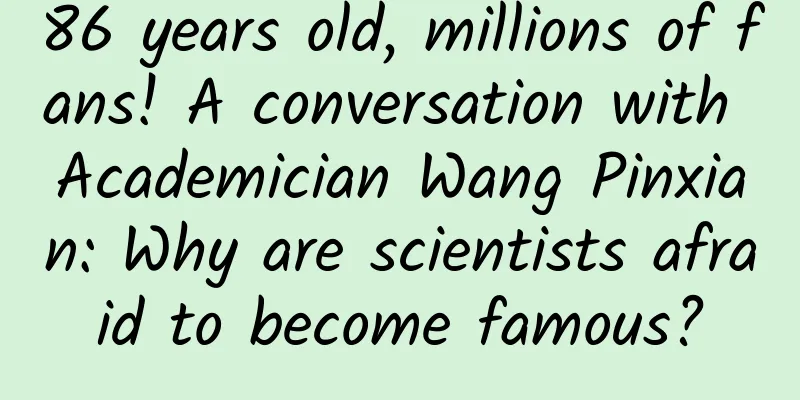86 years old, millions of fans! A conversation with Academician Wang Pinxian: Why are scientists afraid to become famous?

|
Author | Li Chenyang After the Tonga volcano erupted, the popular science videos released by Chinese Academy of Sciences academician Wang Pinxian last year, "Is the island volcano eruption so dangerous?" and "Does the submarine volcano eruption affect us?" ushered in a wave of viewing and forwarding. But he said in an interview with China Science Daily that he would not continue to publish related works on this topic: "I have already said everything I can say in the past videos. I will not chase hot topics, but will do things at my own pace." "I'm 86 years old now. I don't care about anything else but time. I want to finish what I want to do." Academician Wang Pinxian has been very popular recently. In the blue waters of the Xisha Islands, he became the world's oldest deep-sea diver by conducting scientific research on the "Deep Sea Warrior" at the age of 82. On Internet platforms where young people gather, he is a "popular science celebrity" with countless fans. He has 1.4 million fans on Bilibili (B Station) and 560,000 fans on Douyin, and has received more than 5 million likes in total. Recently, Bilibili announced the list of the top 100 UP hosts in 2021. Wang Pinxian's name is prominently on the list. Different from other UP hosts on the list, the most comments received by the old man were not "Congratulations", but this: Wang Pinxian’s legendary experience in scientific research and his image as a science popularizer have made him known as the “Internet celebrity academician”. "I don't think 'Internet celebrity' is a negative word. Influence is a good thing, the key lies in what you exchange it for," he told China Science Daily. As for the phenomenon that some scientists do not want to or dare not to be famous, he expressed both respect and understanding as well as encouragement and expectations. The following is a conversation between Academician Wang Pinxian and China Science News: China Science Daily: Hello, Academician Wang, how did you start your journey as a "popular science celebrity"? △ Wang Pinxian: I started doing some popular science work very early. CCTV interviewed me once and filmed some videos for me. Later, they told me that these materials were very suitable for making short videos on Douyin. Then they designed an avatar for me, which looked like the old man at KFC. I told them to at least change the color. So I opened a Douyin account and soon I had a lot of fans. Later, Bilibili and other platforms also started doing it. To be honest, I'm not very good at these things myself. The National Key Laboratory of Marine Geology at Tongji University has a popular science group, and they helped me make many videos. China Science Daily: What is your most profound feeling during the process of doing online science popularization? △ Wang Pinxian: I didn't expect the online reaction to be so strong. It was something called "bullet screen". It came out like a thunderstorm, and I could vaguely hear the voices of those children. If I teach, the largest classroom has only a few hundred people. I usually only get a few thousand people reading my articles. But on these Internet platforms, there are tens of thousands of people. I feel very happy as if I have made so many young friends. China Science Daily: Many people now call you "Internet celebrity academician". Do you think this is a compliment or an offense? △ Wang Pinxian: I don’t think “Internet celebrity” is a negative word, it should be positive. Some people think the word “Internet celebrity” is bad because some people messed it up. Previously, an Internet platform approached me and asked me to sign an agreement, saying that if I reached a certain number of fans, I would have certain privileges and benefits. I did not sign it. Why would I need these benefits? I don’t need money, and I don’t need to rely on this to gain fame. But what do I want? I want influence. I was elected as an academician of the Chinese Academy of Sciences in my 50s, and served as a representative of the National People's Congress and a member of the Chinese People's Political Consultative Conference for several terms, which gave me the opportunity to interact with leaders. I later succeeded in ocean drilling and deep-sea research, thanks to these opportunities. Otherwise, I would not have been able to knock on people's doors. I recently proposed to build a leading deep-sea museum in Shanghai, which would echo the Shanghai Planetarium and correspond to the two frontiers of space and deep-sea exploration. The media soon followed up with reports. If I don't have influence, no one will listen to me. So some people would exchange their fame for money, but I hope to exchange it for influence and voice, so that I can accomplish some things in the last few years of my life that I didn’t have time to do before. China Science Daily: According to what you said, scientists actually need influence. We believe that society also needs influential scientists and needs to widely spread the voice of science and scientific ideas. But we also see that many scientists now do not want to be famous, dare not be famous, and are more cautious in participating in science popularization activities and accepting media interviews. What do you think of this phenomenon? △ Wang Pinxian: There are several reasons for this. First, scientists are right to be wary of this "traffic". Scientists are not singers or movie stars. Scientific research itself is done in seclusion. Especially for those scientists who are still growing up, before they come to the fore with their achievements, people don’t need to know them or waste their time. Second, some scientists are not good at standing up and doing popular science. I have been lecturing in schools all my life, and I deeply understand one truth: if the lecturer himself is not excited, it is impossible to excite the listeners. You can't blame students even if they doze off, you can only blame yourself for not teaching well. And the worse the teacher, the more fierce he is, because he has nothing else to convince you, he can only scare you with exam discipline or something; while the best teachers are usually kinder, and they can explain the truth clearly in a casual conversation. So scientists who dare to stand in the spotlight and speak eloquently must have their own confidence. Third, it takes a certain amount of courage to face the public, because you will inevitably encounter some critical and opposing voices. I once gave a lecture and saw someone in the back row desperately raising his hand. The host signaled that I could end the lecture, but I still asked him to stand up. He said that I had said the wrong year when I was talking about modern history. I replied, "Thank you for the correction, it's easy for amateurs to sing out of tune." Later, the host told me that this person is just like that, always looking for opportunities to show off himself. I didn't care. If you correct me, I will accept it generously, and people will respect me more. If I always worry about others pointing out my mistakes, it will be meaningless. Finally, there are some issues of the overall environment. Scientific innovation requires an active atmosphere. I remember the former Minister of Culture and writer Wang Meng said that you should speak your own words. We have not done enough in this regard. There are too many clichés, and there are also many clichés in the scientific community. And I think this phenomenon has been getting worse in recent years. This is a very bad problem. Everyone follows others and follows what others say. If there is any responsibility, it is also others'. This kind of culture is not conducive to innovation. You can't expect a brain that can innovate in science and only listen to others. That is contradictory. Combining science and culture is to create a lively atmosphere. So I think it is still very valuable for us to do science popularization. In today's China, science popularization is becoming a new consumer demand, and the emerging science popularization industry has put forward higher quality requirements. Scientists should not be stern and should work with everyone to promote this science popularization cause. Source: ScienceNet Editor: Fangyuan Layout|Li Yan |
>>: The doctor said: Don’t do these 4 things, otherwise you will have another cerebral infarction!
Recommend
Community operation: How to operate a community from scratch?
1. Purpose Addressing current community needs: On...
Sensing sadness, protecting companions, self-destructive behavior... How to explain the "self-awareness" of animals
© The Dodo Leviathan Press: Wikipedia defines sui...
Two major channels for Tik Tok to get free traffic!
There is always not enough traffic for the video,...
The Year of the Snake is a year of "two springs", so we have to "hide from spring"? What's going on?
This Year of the Snake is a double spring year , ...
Today is Lantern Festival丨Light up the lanterns, the moon is full and people are together
Good night to all families Decorate with lanterns...
Mission accomplished! Goodbye, Tianzhou-5!
At 9:13 a.m. Beijing time on September 12, 2023, ...
Summary and comparison of the three major free new media channels for increasing APP downloads!
The ultimate goal of new media for APPs is to dri...
Pillows are only for your head? Maybe you have been doing it wrong for so many years
In our daily understanding, a pillow, as the name...
The sandstorm is coming again! Be especially alert to these major health hazards!
According to the Central Meteorological Observato...
Unveiled today! What’s different about the National Botanical Garden?
April 18 National Botanical Garden Officially unv...
How to effectively deploy private domain traffic? Share 3 links!
The traffic dividend in the second half of the In...
If this symptom occurs in the arm, it may be a sign of a heart attack!
Mention of myocardial infarction I believe many p...
How to write an activity planning proposal?
The end of the year is approaching and various ac...
Zhu Shiba's "Xuelang Plan: From Settlement to Selling Courses" explains the whole process of Xuelang selling courses
Zhu Shiba's "Xuelang Plan: From Settleme...
L3 autonomous driving is becoming increasingly awkward, Audi is advancing on two fronts to alleviate industry problems
There has never been a shortage of big players in...









